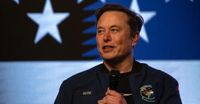On April 22, 2025, Tesla, the electric vehicle giant led by CEO Elon Musk, reported a staggering profit decline of 71%, with earnings plummeting to $409 million from $1.4 billion in the same quarter last year. This sharp drop in profits comes amid a significant slide in auto sales, raising concerns about the company’s future amidst intense competition and political challenges.
Elon Musk's dual role as a business leader and a key figure in the Trump administration has drawn considerable scrutiny. His involvement with the Department of Government Efficiency (DOGE), which has been tasked with slashing government spending and reducing the federal workforce, has sparked protests and backlash against Tesla. Musk's mandate at DOGE is set to expire in late May 2025, and he has indicated plans to refocus his efforts on Tesla in the coming month.
During a conference call with investors, Musk stated, "I think starting probably next month, in May, my time allocation to DOGE will drop significantly." He plans to continue dedicating "a day or two per week" to Washington matters, likely for the remainder of Trump's presidency. This announcement comes as Tesla faces mounting pressure from investors and analysts urging Musk to prioritize the company amid declining sales and stock value.
Tesla's performance has been adversely affected by several factors, including fierce competition from Chinese manufacturers like BYD and a lack of new model offerings. The company has also been criticized for Musk's political affiliations, which have alienated some potential customers. As a result, Tesla's shares have lost nearly half their value since mid-December 2024, raising alarm among investors who are increasingly concerned about the company's market position.
In light of the disappointing earnings, Tesla executives attributed much of the sales decline to production slowdowns as they reworked assembly lines for the new version of the Model Y sport utility vehicle. Additionally, sales of Tesla's much-anticipated Cybertruck have fallen dramatically, down about 50% from the last quarter of 2024. The company has responded by offering discounts of up to $8,500 on the Cybertruck, which starts at $70,000 before incentives.
Despite these challenges, Musk remains optimistic about Tesla's future. He emphasized that the company is still the most valuable automaker globally by stock price and continues to lead electric vehicle sales in the United States. However, the company has refrained from providing a sales forecast for the remainder of the year, citing economic uncertainty and the unpredictable impacts of changing global trade policies.
In a report to shareholders, Tesla acknowledged that "changing political sentiment" could significantly influence demand for its products in the near term. This statement may reflect an awareness of the backlash Musk has faced due to his role in the Trump administration and the resulting protests at Tesla showrooms worldwide.
Activists have targeted Tesla dealerships, leading to vandalism and protests, with many attributing their actions to frustrations over government handouts that they believe are threatened by Musk's policies. Musk commented on the protests, claiming, "The real reason is that those who are receiving the waste and fraud wish it to continue."
Amid these political and economic challenges, Tesla's recent earnings report revealed that the company would have faced significant losses without $400 million in interest from cash and investments and an additional $595 million from selling emissions credits to other automakers.
Looking forward, Tesla is poised to introduce a lower-cost vehicle by the end of June, aimed at making electric cars more accessible to a broader audience. However, details about this new model remain sparse, with analysts expressing skepticism about its production timeline and potential impact on sales.
Furthermore, Musk's ambitious vision for Tesla includes the development of autonomous vehicles, which he believes could revolutionize the transportation industry. However, the company faces stiff competition from established players like Waymo, which has already begun offering paid rides with its autonomous cars in several cities.
As Tesla navigates these turbulent waters, it must contend with both internal challenges—such as production delays and declining sales—and external pressures from the political landscape and market competition. Investors and analysts alike are watching closely to see how Musk balances his commitments to the Trump administration with the demands of leading one of the world's most innovative companies.
In conclusion, as Tesla grapples with a significant drop in profits and increasing competition, Musk's decision to allocate more time to the company may be critical in steering it back on course. The coming months will be pivotal for Tesla as it seeks to regain its footing in a rapidly evolving automotive landscape.




